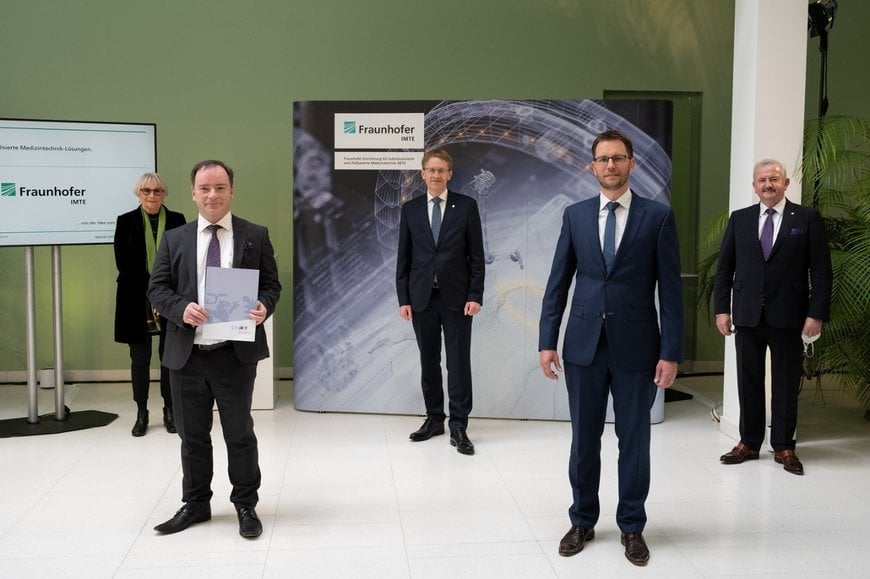www.industry-asia-pacific.com
27
'21
Written on Modified on
The Fraunhofer Research Institution for Individualized and Cell-Based Medical Engineering IMTE gets the green light
Individualized medical engineering is the answer to a growing demand for precision diagnostic techniques that identify patient-specific and disease-specific influencing factors and use these to develop highly effective prevention, diagnosis and treatment procedures with few side effects.

This is at the core of the new Fraunhofer Research Institution for Individualized and Cell-Based Medical Engineering IMTE, which emerged from the Fraunhofer Research Institution for Marine Biotechnology and Cell Technology EMB as a result of strategic realignment and restructuring measures in December 2020. Supported by the state of Schleswig-Holstein, its research focus is on developing innovative, personalized medical products for diagnostic and treatment applications. The funding decision of the state of Schleswig-Holstein has now officially been delivered.
The individual biological characteristics of people, as well as their particular lifestyles and environment, have a major influence on the diseases that might affect them in the future. These factors determine the probability of their developing a disease, how it will progress and how well the patient will respond to the treatment options open to them. Individualized medical engineering, then, is about developing solutions that are uniquely tailored to the needs of each and every patient. In order to maximize synergies and potentials, Fraunhofer is stepping up its long-standing collaboration with the Universität zu Lübeck and its institutes for both medical engineering and electrical engineering in medicine. Fraunhofer EMB is being expanded to include the medical engineering sector for this purpose. To make this expansion visible to the outside world, on December 1, 2020 Fraunhofer EMB changed its name to Fraunhofer Research Institution for Individualized and Cell-Based Medical Engineering IMTE.
The new research institution is systematically aligning its services and developments with the process of getting approval for medical products and bringing them to the market. In so doing, it is actively contributing to translation into clinical trials and the commercialization of personalized medical engineering.
As the Minister President of Schleswig-Holstein Daniel Günther said: “Medical engineering is one of the key technologies of the 21st century. The Fraunhofer Research Institution is making a real difference to the continued growth of the healthcare sector here in the region. It would be a great advantage for us to have, with Fraunhofer IMTE in Lübeck, a second Fraunhofer Institute in Schleswig-Holstein. The state is behind this venture and therefore lending its support. We are confident: Fraunhofer IMTE will stop at nothing to act as a catalyst for a great many new life science applications!”
“As a transdisciplinary research organization, the Fraunhofer-Gesellschaft creates the ideal foundations for achieving outstanding, innovative results in health research for cost-intelligent precision medicine aimed at the welfare of patients,” says Prof. Reimund Neugebauer, President of the Fraunhofer-Gesellschaft. “By realigning Fraunhofer EMB to become Fraunhofer IMTE, we are making an important contribution to overcoming the major social challenges ahead of us and to the advancement of individualized medical engineering. The new profile of Fraunhofer IMTE not only complements the Fraunhofer portfolio, it also fits seamlessly into the structures in place at the Lübeck location. The new Fraunhofer research institution is set to strengthen and enhance this region with medical engineering as the key research focus and economic factor.”
To stay abreast of the organizational and structural aspects of this realignment too, the Executive Board of the Fraunhofer-Gesellschaft decided to appoint Dr. Thorsten Buzug as the new Managing Director. Prof. Philipp Rostalski has also been appointed as a Director of the Fraunhofer research institution.
“By pooling expertise from medical engineering and cell technology, and with its strong links with leading university hospitals and the close integration of the regulatory aspects, Fraunhofer IMTE is offering a unique range of services for the medical device sector,” emphasizes Prof. Thorsten Buzug. “The integrated approach Fraunhofer IMTE is taking to address issues and research projects concerning individualized medical engineering, from basic research to the construction of the device, is paving the way for transferring personalized instrumentation into hospitals and industry,” adds Prof. Philipp Rostalski.
The state of Schleswig-Holstein has committed to supporting the development of the Fraunhofer Research Institution for Individualized and Cell-Based Medical Engineering IMTE by providing substantial funding for a state project. The grant decision, for an initial amount of 12.1 million euros with a funding quota of 90 %, has now been delivered in Lübeck. Around another 29 million euros have been announced for the upcoming EFRE periods from 2023–2026.
www.fraunhofer.de

